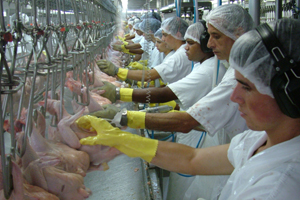People make the business

A poultry processing operation is not really an inspiring environment. But its success highly depends on the quality and variety of products the company is producing. This much depends on the motivation of the personnel. Social ?management is a key production factor.
By Eduardo Cervantes Lopez, Poultry Processing Consultant, Barranquilla, Colombia
We all know a poultry processing company runs on three key elements: money, equipment (facilities) and Human Resources. Money is used to buy the raw material and cover all costs involved in turning this material into finished products. Facilities and equipment are the infrastructure needed to achieve this goal.
The Human Resource is the psychological force that, with its attitude, marks the difference between success and failure of a business. The first two elements are similar in all companies and differs only in the size of machinery and technology.
Global market
Given the fact that in the 21st century there is only one global market with open trade agreements between many countries, managers of successful companies have addressed that by conducting a “social management” programme. Through this it is possible to create a good atmosphere for an integrated group of people, able to check quality, performance and operating expenses. Just to be competitive in a rapidly changing market.
To achieve this challenge, successful companies regardless of their size, have a number of issues in common to be taken into consideration.
Restrictions
The broiler industry has a competitive advantage over other producers of animal protein. It is the only sector that is able to produce meat with the least amount of grains. This is a fundamental fact, as currently the market for meat products originating from terrestrial animals has to be more efficient than ever before because of three major restrictions:
- Genetic engineering made it possible to only gradually increase the production per hectare of cereals.
- The land available for cultivation is becoming increasingly scarce. Only Brazil has a substantial reserve.
- The water sources for agriculture are also being reduced by well- known factors.
Beneficial reality
As a result, it is crucial to produce as much animal protein with less grain available and in the shortest time as possible. At this point, it is worth recalling some comparative statistics. To produce 1 kilo of beef requires about 6 kilos of grains. For one kilo of pork, 3 kilos of cereals are needed. A kilo of chicken meat only needs 1.7 kilos of grains.
This beneficial reality demands that companies engaged in the broiler industry develop a corporate philosophy, where people who work here make this possible. Therefore, the biggest daily efforts are aimed at creating an organisational climate in which individual satisfaction is the catalyst of an environment where the passion to give the best of oneself is maintained at all times.
Recruitment process
Recruiting personnel can be defined as the beginning of social management. Depending on the overall quality of the people who are hired, the company will meet its objectives. In this regard there are two situations:
- Unfortunately hiring the wrong person, due to deficiencies in the selection procedure. But a person is urgently needed to fill the vacancy.
- Hiring the right person for the full potential offered in special circumstances of time.
Both scenarios lead to raise the million dollar question: Which one is more risky and costly for the company? If you hire the wrong person, but you are thinking he has the right profile, you may be disappointed. In the course of their daily work, unfortunately you may come to the conclusion that this person does not perform as expected. The other side of the coin: Hire a person with a lot of talent and potential. If you are not offered the right environment, sooner or later you will feel frustrated and decide to leave the company. As a result, expensive time and money are lost. For this reason, careful selection is recommended, bearing in mind the following tips:
Comprehensive research
Staff selection is a process that cannot be done against the clock. Comprehensive research takes time to judge candidates, despite the urgent need for them. In the workplace there are many people who have excellent academic standards and great experience. However, these are not the parameters to be taken into account in the selection of the person.
Grade Human Quality ultimately makes the difference between synergy or rejection. This condition is unique to individuals. A talented person with great potential, effective working skills, but without ‘human quality skills’, will be a disruptive factor, instead of being a binding element.
There’s a need for grouping the efforts of the team, projecting integral leadership and permanent charisma filled with enthusiasm to peers in the company. Enthusiasm is a force that is backed by conviction. Consequently, any goal that is necessary to achieve, despite the difficulties that may arise, will succeed to the satisfaction of the group. This improves the competitiveness of a company in the market.
Special working environment
If companies don’t offer a work environment that is characterised by the following recommendations, it’s going to be difficult to make your employees work effectively. Creating an environment for effective study and research is advisable. If knowledge and experience are acquired, this must be associated with the goal that must be achieved. After all, results are the target.
Foster an environment where the passion for product innovation is corporate philosophy. This will make the difference between staying or disappearing in a market where consumers are increasingly more demanding and are expecting new products.
So the permanent question must be what can be the added value to products of today, to fully meet the needs of consumers?
Think as a customer
Unfortunately many companies act as suppliers of products and/or services. Consequently, they don’t fully understand the needs of their customers as they have a low feedback relationship with them. This poses a new challenge – always work with the customer in mind. It is a proven philosophy which can achieve two goals:
- Detect unknown needs that customers may have.
- Create new customer needs.
These two concepts have effectively been developed and allow the company to go further into a dynamic positioning in the market for new sales opportunities. The pace of creating these new opportunities will make the difference in business leadership. This condition will create demand for the products offered.
Freedom of thoughts
In short, social management in a company serves to make the labour force work with a positive attitude. This is based on an ongoing volcanic eruption of ideas, products and services to meet the continuously changing demands of the market.
It is therefore very important that personnel work amidst the idea of freedom of thoughts that allows thinking about what can be offered to customers and prospects. This forces a break in the paradigm of “always stay in the comfort zone”. The daily challenges should be seen as a great opportunity to expand the comfort zone, rather than a threat.













